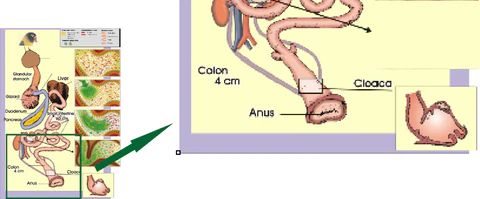
Hot summer months
In addition to the heads and throat, manure is asignificant clinical indicator in assessing a bird’s health.
We always advised administering extra Megabactine during days of great heat.This preparation ensures the retention of an extrasupply of water in the intestine through the formation of a gel. Birds do not have a bladder as a urine reservoir but acloaca, in which manure and urine are mixed.The system is very sophisticated and assists inmanaging the water supply optimally.
Sometimes, too much water is discharged.
Wet manure?

The contents of the cloaca can be moved up into thelarge intestine by intestinal movements, where the water can be reabsorbed intothe bloodstream, or a short movement can accidentally push the droppings downtoo early, which appears as diarrhoea.
Changes in diet and drink intake, as well as (heat)stress conditions, cause a shift in this balance, with watery droppings beingwrongly attributed to infection.
Many fanciers then raise the alarm and immediately putantibiotics in the water; sure enough, things are already moving in the rightdirection.
However, this is due to the reduced water absorption asa result of the taste of the dissolved antibiotic (chemical agent), which leadsto a correction and the manure becoming drier again.
When it is hot, the birds need extra energy to keeptheir body temperature down (air conditioning operation).
Our birds are powerful and live proportionally muchlonger than mammals of the same weight because their metabolism can generateenormous amounts of energy from oil, using lots of oxygen to make flyingpossible.
The COMED range and the various schemes, inparticular, are built on this principle.
Read more about this in the arch article The pigeon is an amazing flying machine.
